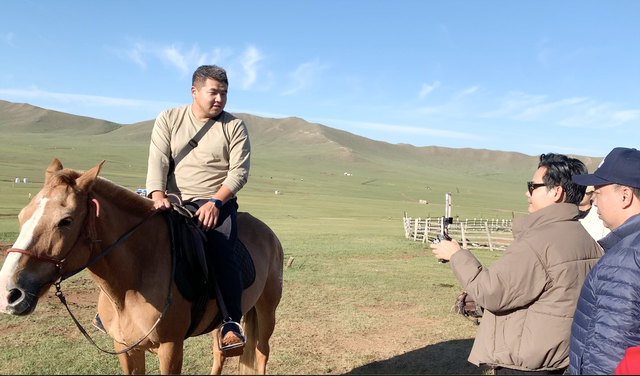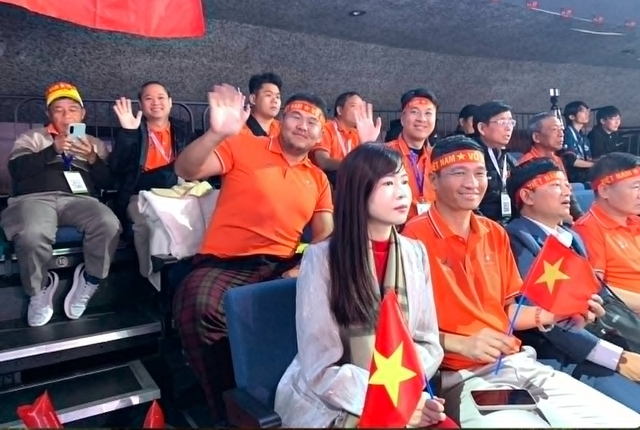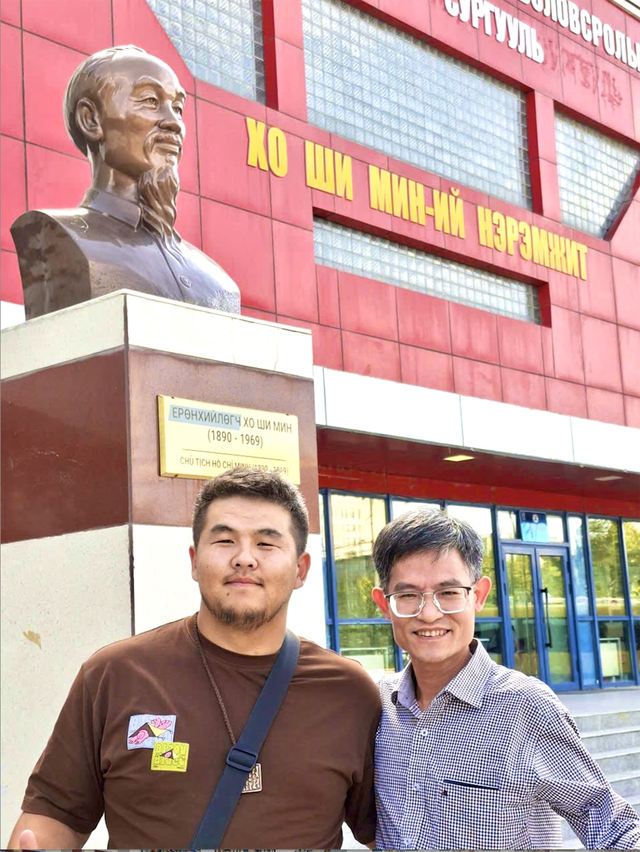
Mongolian tour guide keeps Vietnam close to heart while chasing medical dream
With a bright smile and fluent Vietnamese, 25-year-old Ochirjantsan Bilegsaikhan—affectionately known as Tung by his guests—has become a familiar face for Vietnamese tourists exploring Mongolia’s vast grasslands.

Ochirjantsan Bilegsaikhan (L) instructs Vietnamese tourists on horseback riding on the Mongolian steppe. Photo: Tran Huynh / Tuoi Tre
But behind the guide’s casual confidence lies a more ambitious path: a final-year medical student chasing a dream to become a cardiologist.
Tung’s journey began in a school named after Vietnam’s revolutionary leader, Ho Chi Minh, in the heart of Ulan Bator.
There, he first encountered the Vietnamese language through songs and folk dances.
“I was curious about the people and culture,” he recalled.
After high school, he turned down the chance to study in Russia and instead applied for a Vietnamese government scholarship.
In late 2018, at age 19, he boarded a four-day train journey across China to Hanoi, where he would begin a long and often difficult academic road.
A difficult diagnosis: studying medicine in Vietnamese
“I couldn’t say a word in the first few months,” he laughed, remembering the challenge of learning Vietnamese—a tonal language far removed from Mongolian.
His Vietnamese teacher nicknamed him Tung, and the name stuck.
After a year studying the language at Thai Nguyen University in the namesake province in northern Vietnam, he entered Hanoi Medical University in 2019.
“Vietnamese people are warm, and the culture feels familiar. The medical training there is very practical and hands-on,” he said.

Ochirjantsan Bilegsaikhan (2nd row) cheers for Vietnam’s Robocon team during the Asia-Pacific Broadcasting Union Robocon 2025 final in Ulaanbaatar, Mongolia, August 24, 2025. Photo: Tran Huynh / Tuoi Tre
But language barriers, especially in complex subjects like cardiology and anatomy, often left him lost.
When the COVID-19 pandemic disrupted in-person classes and moved everything online, the challenges compounded.
Eventually, Tung returned to Mongolia to complete his studies at Etugen University.
He is now in his final year, maintaining a strong 3.4 GPA and preparing for residency exams in cardiology—the very subject that once nearly derailed his studies.
Summer guide, future doctor
To pay for tuition and support himself, Tung works as a tour guide during Mongolia’s summer season.
Each July and August, he dons a different uniform—one of a cultural bridge between the two nations.
Greeting tourists at Ulan Bator’s Chinggis Khaan International Airport, Tung offers more than standard sightseeing.
He shares anecdotes from both Mongolian and Vietnamese history, drawing comparisons that bring ancient capitals and nomadic legends to life.
“Every tour is a chance to connect people and cultures,” he said.
Working for a local travel firm founded by Zolo Zolkhuu—a Vietnamese-educated entrepreneur—Tung earns around US$50 per day, enough to pay for his studies and even buy a car.
“I don’t want to be a financial burden to my family,” he said.
“I’m the oldest of four, and my parents have already sacrificed a lot.”

Ochirjantsan Bilegsaikhan (L) poses with Tuoi Tre journalist Tran Huynh at the Ho Chi Minh monument on the campus of School No. 14 in Ulaanbaatar, Mongolia. Photo: Hong Phuc
Zolkhuu praises his young guide as “professional, thoughtful, and inspiring.”
“Tung doesn’t just guide tours—he tells real stories that move people. He’s a source of pride for our company,” he added.
Vietnam in his heart
Despite his return to Mongolia, Tung has not left Vietnam behind.
He keeps up his Vietnamese through books, movies, and music.
He still dreams of returning—this time, for a master’s degree in medicine.
“When I first came, I didn’t speak the language or know anything about the field. Now I’m more prepared, and I want to come back,” he said.
“Vietnam gave me a lot of support and warmth.”
Bao Anh - Tran Huynh / Tuoi Tre News
Link nội dung: https://news.tuoitre.vn/mongolian-tour-guide-keeps-vietnam-close-to-heart-while-chasing-medical-dream-103250908141149431.htm